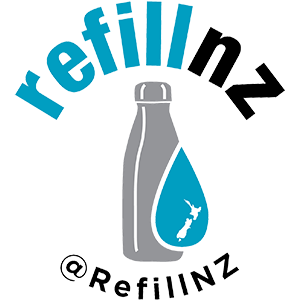RefillNZ is growing for bigger impact!
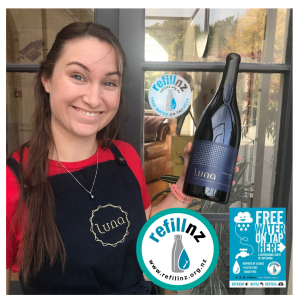
Since launching in October last year, we’ve gone from 30 to 300 RefillNZ stations. From Invercargill to KeriKeri, we’ve had great support from volunteers, community groups and local government to help reduce plastic pollution in New Zealand.
RefillNZ launched in October last year with the help of three fundraising film nights and a kind donation from a wonderful person. Through this we were able to print our first set of stickers and launch our website.
We started off cycling around Wellington and got our first 30 stations on board. With help from Healthy Families, Lower Hutt and other keen volunteers, these numbers have now grown to 160 in the Greater Wellington region.
Then the Community Trust of Wellington and the Wellington City Council supported us with some funding. This, combined with hundreds of volunteer hours, has resulted in 300 RefillNZ stations across the country.
We’ve also set up a new search engine on our website that helps people easily find a RefillNZ station in their area.
What’s next for RefillNZ?
We’re upping our visibility with lots of social media posts, some groovy posters, and engaging with media outlets, including TVNZ, the NZ Herald, Radio NZ, Stuff and NewstalkZB! This generates more and more interest and we’re now trying to find funding to support getting more people on board.
We’ve also had lots of interest from Health organisations who are keen to reduce the amount of sugary drinks people have by promoting tap water as the first drink of choice. We’ll be working with Auckland DHB and their Wai Auckland campaign over the next 6-12 months. So expect to see lots of stations popping up in Auckland soon!
Public fountains and single use bottles in NZ
Public water fountains have been identified as a possible way to reduce single-use bottles and the amount of sugary drinks people consume. However, recent research shows public fountains are often hard to find.
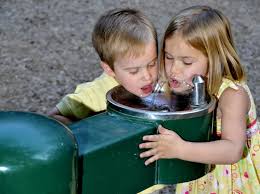
It’s estimated a million plastic bottles are produced each minute. This includes bottled water to sugary soft drinks. Clever marketing has convinced people they need to drink litres of liquid every day, but actually most people are drinking far more than they need to.
An added problem is that public water fountains are often hard to find, and the cost to councils of installing new fountains is expensive, (estimated $10,000 – $25,000).
Recent research by Otago University found that only a fifth of childrens’ playgrounds in the lower North Island had drinking fountains. Another study found only 6 percent of Wellington City playgrounds had drinking fountains. Similar to the six per cent figure for drinking fountains in all of Auckland City’s parks.
This lack of fountains, combined with the massive marketing campaigns by soft drink companies, have made it the norm to buy water or soft drinks instead of refilling with tap water.
This is not just creating a massive environmental problem but also a major health issue. New Zealand now has the third highest adult obesity rate in the OECD and one in 10 children are obese. In addition, dental care is a significant health problem in New Zealand, with sugary drinks being a significant factor.
It’s important for councils to consider that although the upfront cost of installing fountains may be high, the cost to the environment and our health is higher.
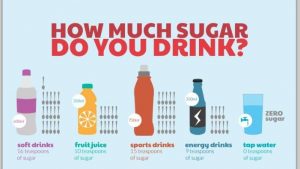
How environmentally friendly are biodegradable plastics?
Biodegradable and compostable bioplastics have been touted as the solution to our throw-away lifestyles, allowing consumers to enjoy single-use items guilt-free. Turns out, it’s not that simple.
In the latest blog and idea from Refill in the UK, they take a look at the topic more closely and help you discern the facts from the fiction. What they found was "most bioplastics need to be composted at very high temperatures over a period of several weeks in an industrial composter, and not at home in our garden compost as many of us think". This means a lot of these biodegradable plastics often end up in landfills or our oceans, under conditions where they won’t break down naturally.
So while biodegradable plastics seem like an environmentally friendly solution, they continue to encourage people to use single-use items instead of refilling existing containers.
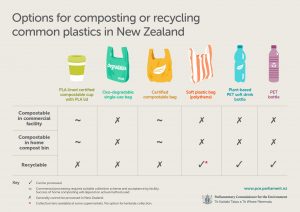
There is also often confusion about what can or can’t be composted in New Zealand. This means many items can end up going to landfills by mistake. Here’s a summary you might find helpful:
Connecting India’s plastic waste pickers to global markets
Reducing waste, creating employment and a fair trade economy
India has 1.5 million waste pickers who collect and sort over 6,000 tonnes of plastic every day. The majority of them face discrimination, poor living and working conditions, and an unpredictable payment system for the plastic they collect. Canadian not-for-profit Plastics For Change has partnered with the Body Shop to help change this.
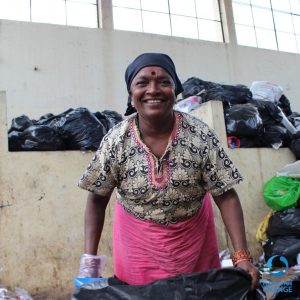
Over three billion people live without formal waste management – that’s almost half the planet’s population. This has given rise to an informal waste picking economy. These waste-pickers are often outcasts in society, lied to and cheated. However, they’re critical workers in helping collect plastic before it enters the world’s oceans.
The Body Shop and Plastics For Change have taken a human approach to tackle this problem.
Plastics For Change enables global brands and manufacturers to source high-quality recycled plastic from responsible supply chains. The company is a not-for-profit social enterprise verified by the World Fair Trade Organisation. Its mobile platform and deal process provides waste pickers with access to fair and consistent income opportunities. It has developed an ethical sourcing platform to create sustainable livelihoods for the urban poor, while transitioning the industry towards a circular economy.
In its first year, The Body Shop will purchase 250 tonnes of Fair Trade recycled plastic to use in nearly three million hair care bottles by the end of 2019. This marks the start of a wider ambition, which is to introduce Community Trade Recycled plastic across all PET plastic used by The Body Shop within three years.
Go plastic free this July
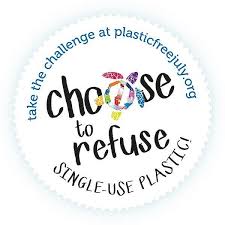
Plastic free July is an annual event that challenges people to give up single-use plastics for a month and reduce waste in their lives.
- Plastic challenge – Fed up with the amount of unnecessary plastic when you go shopping? Us too! We’ll be laying down our own challenge to you, and your family and friends. Details to come on our Facebook page.
- Tune in for tips - We’ll give you tips on how you can easily ditch some plastic. With tips to Reduce, Reuse and Recycle.
- Test your knowledge - Follow us on Facebook and take part in our quizzes.
We’re planning some activities and would love for you to get involved!
We also love hearing about what people do to reduce waste in their lives, feel free to share your ideas too.
That's all from us for now, but do contact us with feedback and ideas for our next e news.
Jill & Serena
